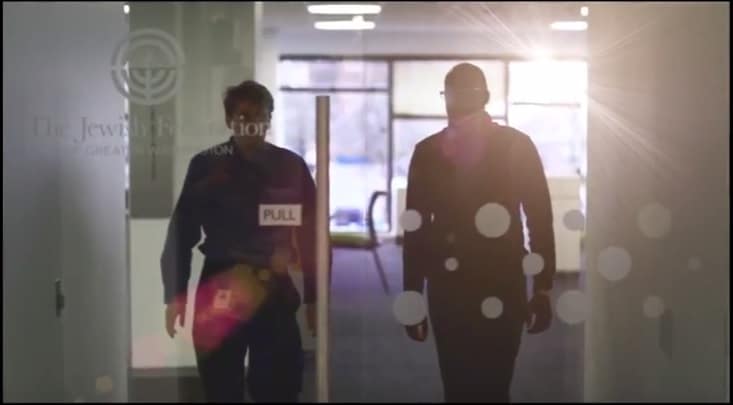-
28 January 2016

Everyone calls him “KC.”
He is 21-years-old. He attended Montgomery County Public Schools for his entire life. He lives in Montgomery Village with his mom and dog, Zoya, “who has a pink nose and a curly tail.” And three days a week, he is a colleague of mine at The Jewish Federation of Greater Washington.
KC, who has special needs, is a participant in The Jewish Foundation for Group Homes’ (JFGH) Robert and Sally Goldberg MOST™ (Meaningful Opportunities for Successful Transition) program. MOST™ is a one-year individualized program of activities and training, designed to facilitate successful transition into the adult community for individuals with special needs. It focuses on self-sufficiency, community and vocation. The Jewish Federation is deeply proud to support and participate in this program, and thrilled to have KC working with us this year.
I’ve had the pleasure of spending time with KC and his work coach Amadu. KC has a great sense of humor and a keen eye for detail. He tells me he likes working at Federation and that the staff are, “very nice; very friendly.” Every morning, his mom gives him a ride to the JFGH offices, where he and other MOST™ participants gather before they head off to work. Amadou then brings KC to Federation, where he works from 9:00 am to 1:00 pm before taking public transportation home.
KC has a variety of responsibilities at Federation, including keeping the coffee stations filled, the copiers stocked and most recently, inputting survey results from a recent Federation program into the computer. He says that math is fun but spelling can be a challenge. He’s learning about the rhythms of the workplace, including the best ways to interact with colleagues.
After he finishes the MOST™ program, KC dreams of attending Montgomery College to continue his education, pursue a career and “earn more money.”
KC is one of many individuals with disabilities who live in our community and who are benefitting from innovative programs like MOST. KC reminds us that with the support of a welcoming community, those living with disabilities can live with independence, dignity, choice and inclusion – as all of us should be living.
On February 1, we begin our celebration of Jewish Disability Awareness and Inclusion Month (JDAIM).
But to spend only one month a year dedicating ourselves to promoting awareness and conversation around disabilities and inclusion is not enough. Unless we are aware, we cannot discuss. Unless we discuss, we cannot change attitudes. And unless we change attitudes, we cannot possibly take action. Inclusion is far more than awareness; it’s action. And our Jewish community deserves the inclusion and engagement of all.
Imagine:
…a world where all Jewish children are welcomed into our schools and offered a first-class education according to their abilities;
…a world where all Jews are welcomed into our synagogues and offered a chance to be spiritually uplifted regardless of their abilities;
…a world where all Jewish institutions never said, “no,” but only said, “of course.”
KC told me that he’s “not a morning person,” but that, “it feels really good to have a place to go on Monday, Wednesday and Friday mornings.”
It feels really good to have KC as my colleague.
Shabbat Shalom,
Steve Rakitt

